

Behavioural Economics / Finance. William Lazonick: How High CEO Pay Hurts the 99 Percent. By William Lazonick, professor of economics and director of the UMass Center for Industrial Competitiveness.
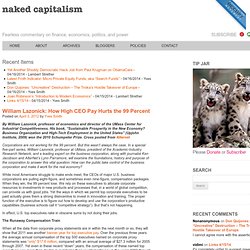
His book, “Sustainable Prosperity in the New Economy? Business Organization and High-Tech Employment in the United States” (Upjohn Institute, 2009) won the 2010 Schumpeter Prize. Cross posted from Alternet Corporations are not working for the 99 percent. But this wasn’t always the case. While most Americans struggle to make ends meet, the CEOs of major U.S. business corporations are pulling eight-figure, and sometimes even nine-figure, compensation packages.
Zombie Economics. This Is Where "The Money" Really Is - Be Careful What You Wish For. We have long shown that "investors" whatever that term means in the New Normal - those gullible enough to put their money in Bennie Madoff, pardon Bennie Bernanke Asset Management?
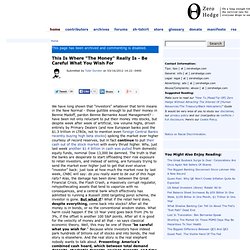
- have been not only reluctant to put their money into stocks, but despite week after week of artificial, low volume highs, driven entirely by Primary Dealers (and now European banks post the $1.3 trillion in LTROs, not to mention even foreign Central Banks recently buying high beta stocks) spiking the market ever higher courtesy of record reserves, but in fact continue to pull their cash out of the stock market with every thrust higher. Why, just last week another $1.4 billion in cash was pulled from domestic equity funds, nominal Dow 13,000 be damned. Adrift in a Sea of Economic Data. Yves here.
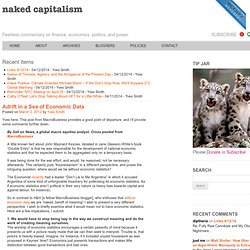
This post from MacroBusiness provides a good point of departure, and I’ll provide some comments further down. By Sell on News, a global macro equities analyst. Cross posted from MacroBusinessA little known fact about John Maynard Keynes, detailed in Jane Gleeson-White’s book “Double Entry” is that he was responsible for the development of national economic statistics and that he expected them to be aggregated only on a temporary basis.It was being done for the war effort, and would, he reasoned, not be necessary afterwards.
This certainly puts “Keynesianism” in a different perspective, and poses the intriguing question: where would we be without economic statistics? Hawtrey on the Interwar Gold Standard « Uneasy Money. Hawtrey on the Interwar Gold Standard I just got a copy of Ralph Hawtrey’s Trade Depression and the Way Out (1933 edition, an expanded version of the first, 1931, edition published three days before England left the gold standard).
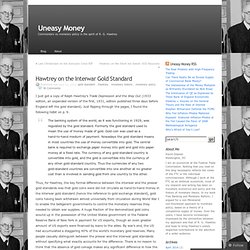
The influence of macroeconomic ideas. Prospects for the World Economy in 2012. C.P.
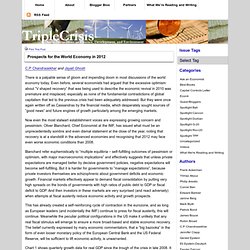
Chandrasekhar and Jayati Ghosh There is a palpable sense of gloom and impending doom in most discussions of the world economy today. Even before, several economists had argued that the excessive optimism about ”V shaped recovery” that was being used to describe the economic revival in 2010 was premature and misplaced, especially as none of the fundamental contradictions of global capitalism that led to the previous crisis had been adequately addressed. But they were once again written off as Cassandras by the financial media, which desperately sought sources of ”good news” and future engines of growth particularly among the emerging markets. Now even the most stalwart establishment voices are expressing growing concern and pessimism.
This has already created a self-reinforcing cycle of contraction in the eurozone, and as long as European leaders (and incidentally the IMF) continue to press for fiscal austerity, this will continue. Olivier Blanchard didn't learn anything from the crisis. Olivier Blanchard, top economic honcho at the IMF (not the impossible mission force), says things are bleak and here are his four lessons from the crisis (brace yourself): "First, post the 2008-09 crisis, the world economy is pregnant with multiple equilibria—self-fulfilling outcomes of pessimism or optimism, with major macroeconomic implications.

Second, incomplete or partial policy measures can make things worse. Third, financial investors are schizophrenic about fiscal consolidation and growth. Bastiat's Insight on Government Inaction. I've noticed in discussions--in person, on Facebook, and in blogs--how hard it is for most people to see that opposition to having the government subsidize or require activity X does not mean that one opposes activity X.
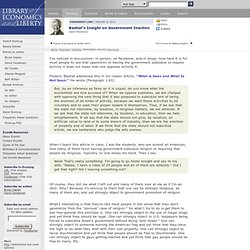
Frederic Bastiat addressed this in his classic article, "What is Seen and What Is Not Seen. " He wrote [Paragraph 1.63]: But, by an inference as false as it is unjust, do you know what the economists are now accused of? Economists and Democracy by Dani Rodrik. Exit from comment view mode.
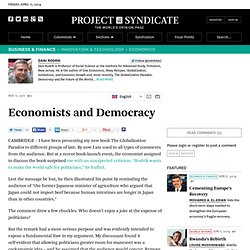
Click to hide this space CAMBRIDGE – I have been presenting my new book The Globalization Paradox to different groups of late. By now I am used to all types of comments from the audience. The Big Lie. Trustee to Seize and Liquidate Even the Stored Customer Gold and Silver Bullion From MF Global. MF Global Transferred $200 Million Cash to JP Morgan in London Three Days Before Bankruptcy. MF Global Client Attorney Explains In 1 Sentence Why JP Morgan's Involvement In MF Global Is Suspicious. MF Global chief missing $1.2B is financial adviser to EPA. Video: Sims and Sargent Nobel Lectures. Mr. Market's Rorschach Test. Last Thursday, the ECB announced that it would not be raising the policy interest rate, and hinted strongly that it would not be raising the rate in June either.
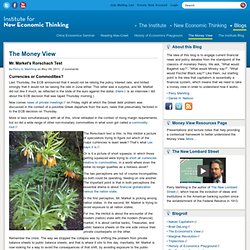
Recession, Restructuring, and the Ring Fence - October 3, 2011. October 3, 2011.
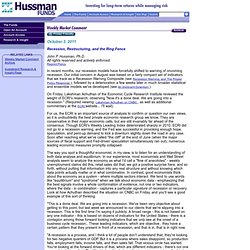
Trendy economic subjects. Crise islandaise. Why Black Market Entrepreneurs Matter to the World Economy. Réflexions sur la création monétaire. Modèle scandinave. Is the Near-Trillion-Dollar Student Loan Bubble About to Pop? September 21, 2011 | Like this article? Join our email list: Stay up to date with the latest headlines via email. The False Dichotomy of Greed. Famous Quotations on Banking. If the American people ever allow private banks to control the issue of their currency, first by inflation, then by deflation, the banks…will deprive the people of all property until their children wake-up homeless on the continent their fathers conquered…. Goldman, JP Morgan Have Now Become A Commodity Cartel As They Slowly Recreate De Beers' Diamond Monopoly. A Moment Among the Minskians. The Banking Oligopoly.